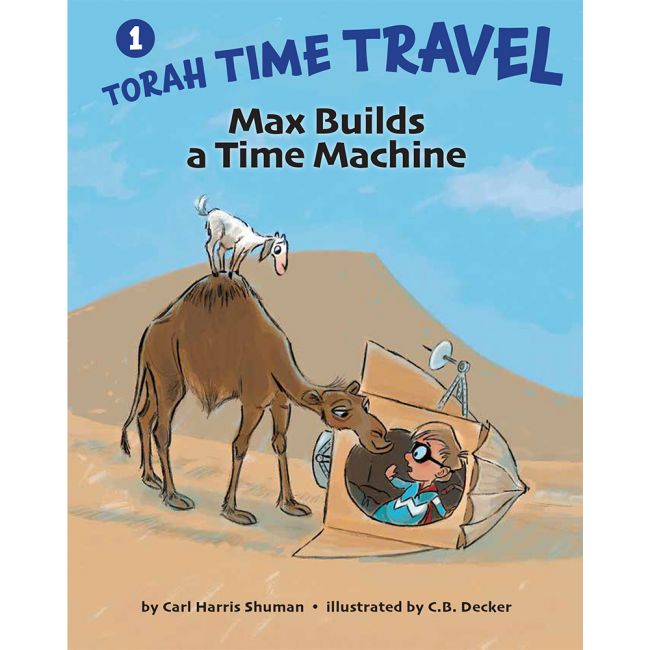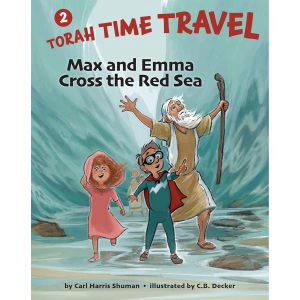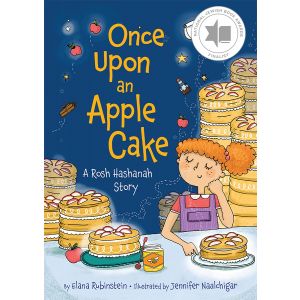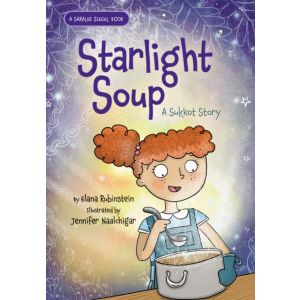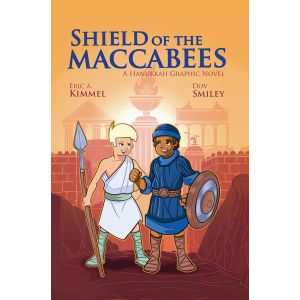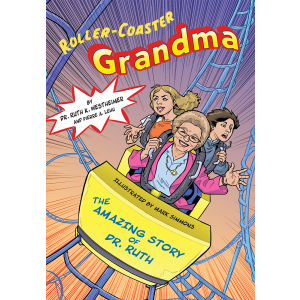Max Builds a Time Machine
What do you get when you combine a cardboard box, some spare parts, and a smartphone?
A time machine, of course!
Max likes to build things from cardboard, and a time machine is his latest invention. However, he's not so good at building friendships. That's why he's been avoiding Emma, the new girl in class.
When they learn that three angels once visited the biblical Abraham and Sarah, Max and Emma are both bursting with questions. Did the angels have wings? What did they eat? There's only one way for Max to find out: travel back in time to meet Abraham, Sarah, and the angels himself.
He might even learn something about friendship along the way.
About the Author
Carl Harris Shuman is also the author of Max and Emma Cross the Red Sea. When he is not writing stories or lawyering, Carl paints, gardens, and frequently leads Shabbat services at Congregation Chisuk Emuna. He lives with his wife, Beth, in Harrisburg, Pennsylvania and enjoys visiting his grandchildren in Brooklyn.
About the Illustrator
C.B. Decker also illustrated the Avi the Ambulance series and Farmer Kobi's Hanukkah Match. She lives in Eagle Mountain, Utah.
From the Note for Families
Imagine you have just moved to a new neighborhood and don't know anyone in your class, on the playground, or in your synagogue. How would you feel?
Or imagine that somone new in town asks to play with you. Would you give that person a chance? Does it matter what other kids think?
Max may not be so good at building friendships, but he does know how to build things out of cardboard and spare parts--including a time machine! When he travels to biblical times, he discovers what it feels like to be the "new kid on the block" (or in the tent).
It takes imagination to create a time machine and courage to visit the unknown. It also takes imagination to build new friendships and courage to welcome newcomers with an open heart.
What are some things you might do to make a new friend feel more welcome?
Max is creative, though a bit odd, and attends Jewish school. He likes to putter and build and has many questions about the Bible and Jewish history. Needing answers to some questions he has about Bible stories, he builds a time machine in his room and sets off to find answers.
He wonders: Do angels have wings? Do they actually eat real food? He does know quite a bit already about Abraham and Sarah and the custom of inviting guests into their tent and he does recognize the three angels and Sarah and Abraham when he arrives. With his cardboard time machine and using 'Miri,' [AKA: Siri] his mother's old partially working cell phone, he goes back 2000 years.
Author Carl Shuman throws delightful humor into every page, into every character's comments. If you've ever wondered if time machines work, if Abraham and Sarah ate brisket, whether angels existed at all, why Max gets his feet bathed upon arrival, even if angels burp after a good meal- this modern midrash will fill you in. And Max isn't the only character. The reader meets one of Max's classmates, a new girl, Emma, who could use a friend. Max is not the life of the party either and so after he returns from biblical times in Canaan and his meeting with Abraham and Sarah, he makes an effort to befriend Emma, because he was the new kid on his time machine journey so he knows what it feels like.
The whimsical illustrations add much to the story. Combining just enough of what you might find in the sand 2000 years ago, like the tent and some camels, Sarah and Abraham are just like everyone else; they kid around, they understand what tickling means, and though they don't recognize Max's modern day light-up-sneakers, they do admire them. For any reader with the desire for a bit more of this midrash, the angels are Simcha [which translates to 'Joy,'], Chalomi [which translates to 'Dreamlike,'] and Ragzoni [which translates to 'irritable,'] and they are certainly in character with their comments. By the end of the story, and back at school, Max and Emma are friends, and so much so that Max invites her to his next time travel adventure to see if the Red Sea really does split! I bet every Jewish person who ever lived has wondered about that!
There are so very many Jewish references in this book: holidays, Shabbat, foods, Bible, Israel... the book is overflowing with milk and honey in all the right places. This is a masterful and fun read. Children (and adults too!) need more books like this.
--Sandy Wasserman, The Sydney Taylor Shmooze
The following is part of a combined review for Max and Emma Cross the Red Sea: Torah Time Travel 2
Easy-to-read language and colorful illustrations make these two time-travel adventure tales based on stories in the Torah excellent introductions to biblical characters. Protagonists Max and Emma use a home-made time machine to travel to ancient times, where they participate in events they have only learned about in Hebrew school.
In the first book, Max has little patience for his classmate Emma. When Max finds himself in Abraham and Sarah’s tent along with three mysterious strangers, he learns an important lesson about hospitality and about the proper way to greet and interact with strangers. When Max returns, he is kinder and more accepting of Emma, and the two start to become friends. A “Note for Families” is appended, summarizing and extending some of the lessons Max has learned during his time travel experience.
In the second story, Max and his family are preparing for the Passover seder, and Max develops a case of stage fright while contemplating singing the Four Questions. This time, his new friend, Emma, and her poodle, Kelev, accompany Max on his time machine adventure. They arrive at the Red Sea shortly before the Israelites are ready to plunge into the water in order to escape the Egyptians, who are chasing them and who hope to reinstate them as slaves. They meet Nachshon, the first of the Israelites to brave the sea before it splits, allowing them to pass in safety. Max learns some important lessons about bravery and that throughout history, public speaking has been a daunting task for many, including Moses. Another “Note to Families” appended to the second story encourages children to face and overcome their fears.
Both books are fun to read and help children and their families think about biblical stories in a new light, drawing attention to connections in their own lives, which will help them become kinder and more confident as they mature. Schools and parents will welcome this series as part of a larger conversation about Jewish and general values that affect children’s daily lives.
--Michal Malen, The Jewish Book Council

